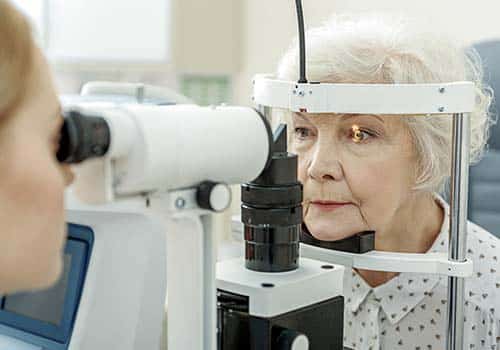Millions of Americans wear eyeglasses or contact lenses; many are covered under a Medicare plan. Eye exams can be expensive, and they are recommended annually.
Eye disease and conditions can also complicate matters, making it imperative to have these routine eye exams. So, many retirees wonder whether Medicare covers their annual eye exams.
In this article, we will tell you everything you need to know regarding Medicare and eye exams. We will tell you what is covered and what isn’t and how you might get coverage for your visit to the eye doctor.
Does Medicare Cover Eye Exams?
Original Medicare does not cover routine vision exams for glasses or contacts. So, if you are visiting the doctor for your annual visit to obtain a prescription for glasses or contacts, you will need to pay 100% of the cost of the visit.
So, what does Medicare cover when it comes to eye exams? Some Medicare Advantage Plans do include vision coverage. These plans will cover some expenses related to your annual eye exam, and they might even provide benefits for eyeglasses or contact lenses. You will likely be required to pay a copayment, but you might still save much money on your vision care.
Medicare Part A and Medicare Part B provide coverage for certain eye exams and procedures for medical conditions. For instance, if you are at high risk for glaucoma, your annual glaucoma screening likely will be covered under Medicare.
In the next section, we will cover the types of procedures that are covered and what you need to do to qualify for them.
KEY TAKEAWAYS
- Original Medicare does not cover routine eye exams; however, it may cover the exam or procedure if it prevents or treats a particular eye disease.
- If you only have Original Medicare, you must cover 100% of the costs for glasses or contacts.
- Certain eye diseases are covered by Medicare, such as Cataracts, Macular Degeneration, Glaucoma, Diabetic Retinopathy, and eye injuries.
What Does Medicare Cover?
So, just what does Medicare cover when it comes to eye care? Generally, Medicare will cover necessary exams and medical procedures. If the exam or procedure prevents or treats a particular type of eye disease, it will likely be covered. However, if the visit is for only corrective lenses, it will probably not be covered. Here are the details you need to know.
-
Routine Eye Exams
Original Medicare does not cover routine eye exams. If you need to head to the optometrist to obtain a new pair of eyeglasses, then this will be an out-of-pocket cost for you. Thankfully, many Medicare Advantage plans, or Medicare Part C, do provide coverage for routine vision care. These vision benefits often include both the cost of the exam as well as the cost of glasses or contacts. To determine the specifics of the coverage, you would need to work with the insurance company that administers the plan. You might also be able to purchase Medicare Supplement insurance, or Medigap, that will help offset the costs of your vision care.
-
Cataracts
When it comes to cataracts, Medicare beneficiaries can breathe a little easier knowing that Medicare covers most expenses related to the diagnosis and treatment of cataracts. If you are diagnosed with cataracts and need surgery, then Medicare will cover eligible expenses associated with the procedure.
If your cataract surgery requires an inpatient stay in the hospital, Medicare Part A usually covers this expense. If the procedure is done on an outpatient basis, then Medicare Part B covers it. Medicare Part B will also usually pay for one set of eyeglasses or contacts after your cataract surgery, especially if the placement of an intraocular lens was required. If you need prescription drugs covered, then you will need to be enrolled in a Medicare Part D plan. -
Macular Degeneration
Many people wonder, “Does Medicare pay for macular degeneration treatment?” The answer is yes. Part B typically pays for exams used to diagnose the disease and treatments for the condition. If you require injectable drugs to treat your age-related macular degeneration, then Part B pays for those as well. These expenses are usually covered at 80% once you have met your annual deductible.
-
Glaucoma
Medicare will cover an annual glaucoma screening, but only if you are considered at high risk for the condition. There are a few things that can place you into the high-risk category. The following are the risk factors that can get your exam covered:
- Diabetes
- Family history of glaucoma
- If you are African American and age 50 or older
- If you are Hispanic and age 65 or older
You can work with your doctor to schedule your glaucoma screening if you have one of the risk factors above. Medicare typically pays 80% of the Medicare approved amount for this exam once you have met your Medicare Part B deductible. -
Diabetic Retinopathy
This condition is caused by damage to the blood vessels in the back of your eye, usually because of poorly controlled blood sugar. It can lead to blurry vision, floaters, and even complete vision loss in some cases. Part B will cover an annual preventive exam for diabetic retinopathy if you have diabetes. In addition, the doctor that you select must be licensed to perform this type of exam in your state.
You should know that your doctor might recommend you have this exam performed more than once per year; however, Medicare will only cover the exam one time each year. -
Eye Injuries
In most cases, Medicare coverage will cover an exam and diagnostic tests to determine the extent of an eye injury. Procedures to treat an eye injury are typically considered medically necessary, so these procedures are usually covered as well. This could be due to anything from eye trauma to a foreign body in the eye. Similarly, eye infections are usually considered a medical treatment, so Medicare will provide coverage for the treatment of an eye infection.
Must read articles related to Medicare
- Overview of what is covered under Medicare.
- Are dental implants covered by Medicare?
- If I need a stair lift for my home, will Medicare cover it?
- Is Cataract surgery a covered expense under Medicare?
- How do you sign up for Medicare?
Best Medicare Plans For Vision Care

Now that you know what Medicare does and does not cover regarding vision care, which plans are the best?
As previously stated, Original Medicare does not cover routine eye exams for corrective lenses. Enrollment in a Part C plan is required to obtain this type of coverage. Thankfully, most Part C plans include some vision coverage and additional benefits. The specifics of deductibles and coinsurance payments vary, and you should select the plan that best fits your needs.
Regarding Medicare options, the two best plans currently available are United Healthcare and Kaiser Permanente.
- Both of these plans cover routine annual exams and provide at least $200 in annual benefits for prescription lenses like glasses or contacts.
- The Kaiser plan has a premium plan with a $400 lens allowance.
TIP
Most Medicare Advantage plans (Part C) provide some vision coverage that typically includes routine eye exams.
The Bottom Line
Many people wonder, “Does Medicare cover vision exams?” The answer is no. Original Medicare does not cover routine exams for corrective lenses.
However, Medicare does cover preventive screenings and procedures for healthcare-related issues, such as cataracts, glaucoma, and diabetic retinopathy.
If you want basic vision coverage, you should speak with a licensed insurance agent to select the Medicare Advantage plan that best suits your needs. You might also decide to sign up for prescription drug coverage.
Frequently Asked Questions
Medicare Part B provides coverage for medically necessary eye exams. This could include screening for glaucoma, cataracts, or macular degeneration.
If an inpatient procedure is required to correct any of these issues surgically, that would be covered by Medicare Part A. Medicare does not cover routine vision exams unless you are enrolled in a Part C plan that provides these additional benefits.
You can learn more about Medicare coverage details for eye exams at Medicare.gov.
A routine eye exam usually costs around $150. You will find that these prices can range anywhere from $75 to $250, depending on the facility you visit.
The cost will be higher if more in-depth screening or procedures are required. In addition, glasses or contacts are a separate charge and are not included in the cost of the exam.
Medicare never pays for routine eye exams for vision. However, if you require eye exams to maintain eye health due to a medical condition like glaucoma or macular degeneration, Medicare will pay for the exam annually.
Even though your doctor might recommend more frequent screenings, Medicare only pays for one yearly exam.
For Medicare to cover an eye exam, you must have a medically necessary reason for the exam. Medicare does not cover routine exams for vision screening.
In some cases, you might need to have one of the risk factors associated with a particular disease for Medicare to pay for the exam.
In other cases, the exam might be covered as long as your doctor agrees that the exam is medically necessary.
An eye exam typically allows the doctor to screen your eyes and assess overall eye health. The doctor may examine the blood vessels and nerves in the eye to ensure the eye is healthy.
This allows the doctor to diagnose certain eye conditions that could be a problem for you in the future.
A vision exam, on the other hand, tests how well you can see. It is used to prescribe glasses or contacts to get your vision as close to 20/20 as possible.
You can find a Social Security Administration office near you by using our SSA office locator and searching for your closest location.





